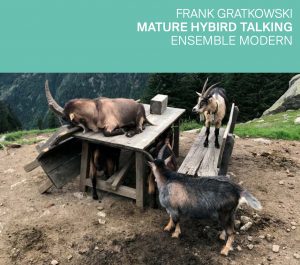Frank Gratkowski / Ensemble Modern “Mature Hybrid Talking”

Ensemble Modern
Dietmar Wiesner – flute
Christian Hommel – oboe
Jaan Bossier – clarinet
Johannes Schwarz – bassoon
Sava Stoianov –trumpet
Till Künkler – trombone
Hermann Kretzschmar – piano
Giorgos Panagiotidis – violin
Eva Böcker – violoncello
Paul Cannon – double bass
Frank Gratkowski – conducting, flute, alto saxophone, bass clarinet
Recorded live on 31 March 2022 in Frankfurt am Main
Recording Volker Bernhard
Mixing Wolfgang Stach, Maarwegstudio 2, Cologne
Mastering Reinhard Kobialka, Topaz, Cologne
Graphic design Sebastian Jehl
Liner notes Richard Barrett
Cover photo Frank Gratkowski
Producer Frank Gratkowski
Executive producer Teresa Coll
Click here to by or listen to the CD
Liner Notes by Richard Barrett:
When listening to notated compositions by creative musicians whose principal focus is improvisation, I’m always initially fascinated by the extent to which they compose their improvisational personality into the notes (or not). The kaleidoscope of colours, densities and unpredictable shifts of direction in Frank Gratkowski’s Mature Hybird Talking are certainly entirely consistent with the sense of spontaneous musical architecture evident from his work on reeds and flute in a variety of contexts. For Gratkowski, improvisation is centrally concerned with the improvisation of structure, flying persuasively in the face of those who might claim that improvisation is inherently less structured than other strategies of composition.
Much of the musical material of Mature Hybird Talking is precisely notated in terms of rhythm and pitch (incorporating quartertones for all the instruments that can play them), although dynamic indications are absent, enabling each participant to balance their own sound spontaneously within the changing textures. On the other hand, the notated modules for between one and ten instruments were assembled into a patchwork-like sequence only during the process of rehearsing with Ensemble Modern, alongside improvisations, featuring Gratkowski either as instrumentalist or as conductor, using hand signals to gather and channel the ensemble’s collective imagination.
When listening, though, one soon lets go of any attempt to guess which of these strategies gave rise to some particular event in the music. Instead, the attention is focused (like the composer’s own attention) on an ebb and flow of musical ideas and energies in which anything might happen at any time but the whole has a consistency and interconnectedness that testifies to Gratkowski’s ability to activate and articulate the spontaneous musicality of his collaborators. It’s an authentically 21st century music, combining a maximum of freedom with a maximum of discipline in a way that represents a significant and vital tendency in contemporary musical thinking.
Although this extended modular composition has a double dedication, both to a composer (Iannis Xenakis, on the occasion of the 100th anniversary of his birth), and to an author (James Joyce), the music “speaks” more in the style of Joyce than that of Xenakis, with its almost constant accumulation of complex utterances, connected to each other and within themselves in a way that seems to echo the precipitous wordplay of Finnegans Wake. And this is indeed how much of the music was composed, although it certainly isn’t necessary to know this in order to appreciate its teeming sound-world.
Listening to Mature Hybird Talking involves taking a journey in time through sonic landscapes, as if navigating a river whose every twist and turn can bring something new and unexpected, while the river itself, in the form of an uncompromisingly non-idiomatic approach to both precomposed and improvised musical creation, remains central even as it alternates unpredictably between rapids and points of repose. Sometimes familiar elements might appear on the horizon – a jazz-inflected bass solo, a recognisable harmony, or a unison melody, but they never unfold as one might expect, becoming strange almost in the same moment they remind the listener of something else. This experience of hearing music as if for the first time is of course one of the most compelling aspects of the music of Xenakis. His legacy evolves still, into ever-renewed arborescences.
